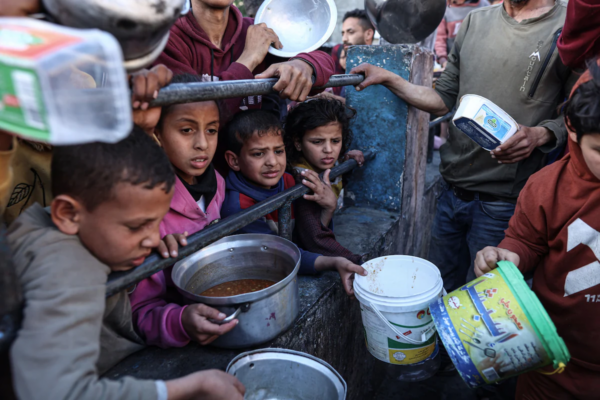PHOTO: Israeli war on Palestinians brings famine to Gaza. “Here’s a question: if it were Israeli Jews who were starving & not Palestinian Arabs, what would we do? Prominent Arab American activist James Zoghby was quoted as asking
Prospect of Israel facing war crimes charges has moved closer after UN condemnation of Gaza aid restrictions
The accusation by the UN and other humanitarians that Israel may be committing a war crime by deliberately starving Gaza’s population is likely to significantly increase the prospect of legal culpability for the country, including at the International Court of Justice.
Amid reports that the Israel Defense Forces are hiring dozens of lawyers to defend against anticipated cases and legal challenges, the charge that Israel has triggered a “man-made famine” by deliberately obstructing the entry of aid into Gaza is backed by an increasing body of evidence.
Already facing a complaint of genocide from South Africa at the ICJ, the UN’s top court – including an allegation that senior Israeli political officials have incited genocide in public statements – Israel is also the subject of a provisional emergency ruling by the court ordering it to admit life-saving aid to Gaza.
On Wednesday, the US Secretary of State, Antony Blinken, underlined the growing sense of crisis as he warned that all of Gaza’s 2 million people were experiencing “severe levels of acute food insecurity” – the first time an entire population of Gaza has been so classified.
Unlike other issues related to Israel’s conduct in its war against Hamas in Gaza, which has claimed more than 31,000 lives and displaced more than 85% of the population amid widespread destruction, the human-made famine occurring in the Palestinian territory appears more straightforward.
While the question of civilian casualties from specific attacks and from the wider policy of bombing will need to be tested against highly contested notions in international humanitarian law such as proportionality and necessity in conflict, the war crime of starvation is simply and clearly defined.
Though Israel denies the allegation, the Rome statute of the international criminal court defines it as the crime of intentionally starving civilians by “depriving them of objects indispensable to their survival” including “wilfully impeding relief supplies”.
Underpinning the allegations is the fact that as a belligerent occupying power in Gaza, Israel is legally responsible under article 55 of the fourth Geneva Convention for “ensuring the food and medical supplies of the population”, which requires the occupier to “bring in the necessary foodstuffs, medical stores, and other articles if the resources of the occupied territory are inadequate”.
A central plank of any case that Israel has provoked a famine is the data generated by the UN’s Gaza famine review committee, staffed by international experts on food security, whose findings this week fall under the auspices of the Integrated Food Security Phase Classification (IPC) – regarded as the international gold standard in assessing food crises.
Highly technical, often cautious, and designed to be neutral in its analysis, the committee – which had already warned of the risk of famine not least in the worst affected region of northern Gaza – has relied on World Food Programme surveys that concluded Palestinians were already facing IPC phase 4 and 5 levels of malnutrition – “emergency” and “catastrophe”.
The IPC committee also examined access for food trucks to the worst affected area, concluding that a “very limited number of trucks carrying food aid is authorized to enter north Gaza and Gaza governates and since 5 February there has been no report of food trucks being able to discharge in Gaza City”.
The IPC’s report is backed up by analysis prepared independently and sent this week to the Biden administration by Oxfam America and Human Rights Watch to highlight Israel’s failure to comply with a new requirement from Washington that recipients of US arms supplies need to comply with international law.
That analysis accused Israel of “systematically prevent[ing] aid” from reaching “the roughly 300,000 Palestinians who remain in northern Gaza, where the threat of starvation is most acute”.
The two organizations added that in the first six weeks of this year, “over half of the planned humanitarian aid missions to northern Gaza were obstructed by Israeli authorities”. Charging Israel with a deliberate policy of starvation, the documents add: “International humanitarian law prohibits parties to a conflict from deliberately causing ‘the population to suffer hunger, particularly by depriving it of its sources of food or of supplies’.”
Exacerbating Israel’s legal exposure over the issue of starvation are public comments made early in the war by the defense minister, Yoav Gallant, advocating a “complete siege of Gaza” and making clear that he meant: “No electricity, no food, no water.”
“We are fighting human animals and acting accordingly,” he said.
While Israel has allowed a minimum of aid to enter under pressure from the US and wider international community, it has faced repeated complaints, including from Joe Biden, that the quality is insufficient, prompting air drops and attempts to open a sea bridge by other countries.
The claims about using starvation as a weapon of war come amid a growing and palpable sense of anxiety in the Israeli military over the mounting legal risks from its offensive on Gaza.
Speaking to the Israeli newspaper Yedioth Ahronoth, an unnamed IDF official said: “The international legal pressure on Israel began gradually before the war, when the international criminal court supported an investigation against Israel in 2019, and in 2021 declared that they have the authority to do that.
“Now the pressure by many countries to prioritize legal action against the IDF and the state has only increased, not only from South Africa’s direction. Just this month the international criminal court issued arrest warrants against two Russian generals for allegedly attacking a Ukrainian power plant and for causing noncombatant casualties without justification.”
THE GUARDIAN


Leave a Reply
You must be logged in to post a comment.